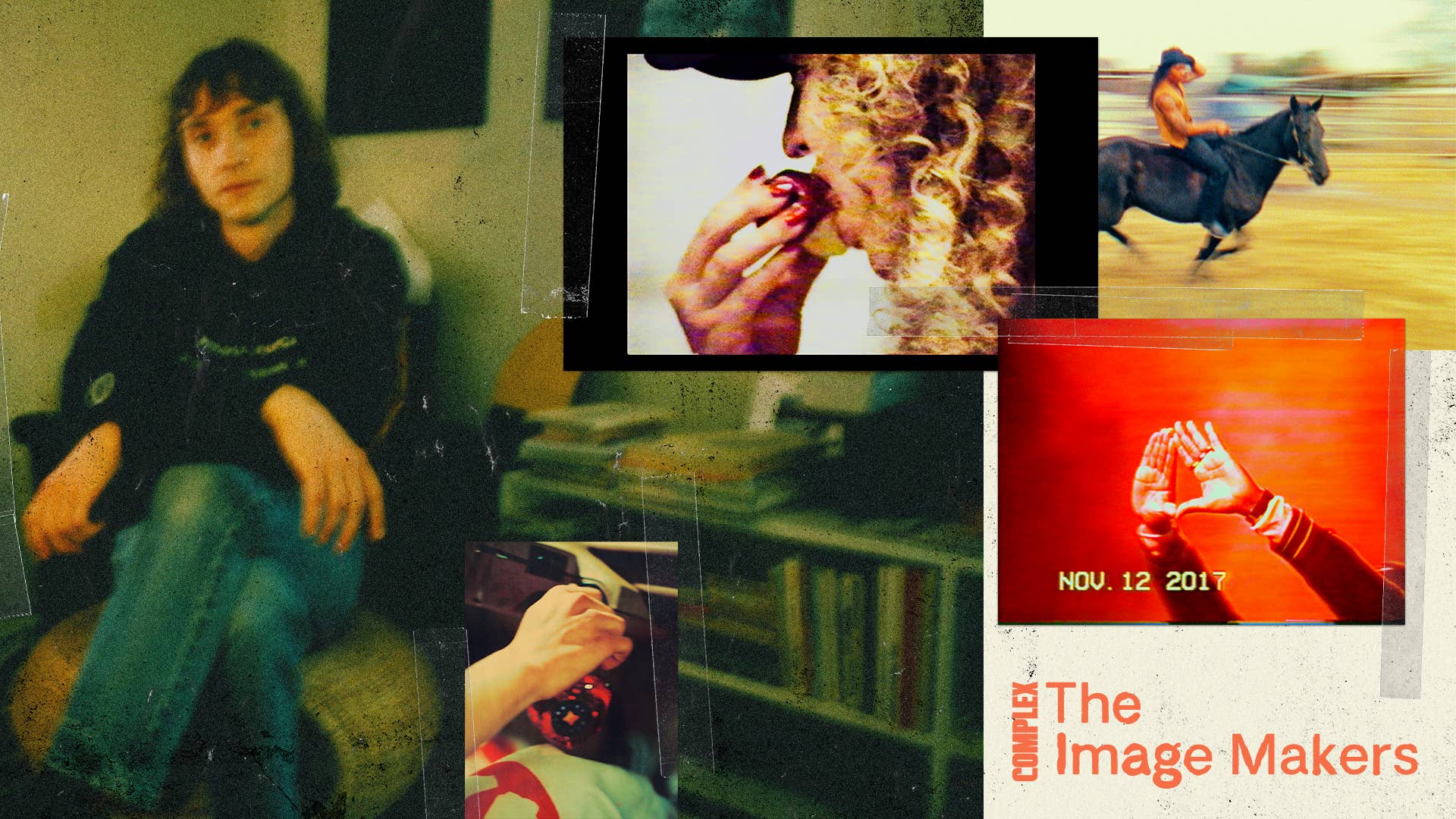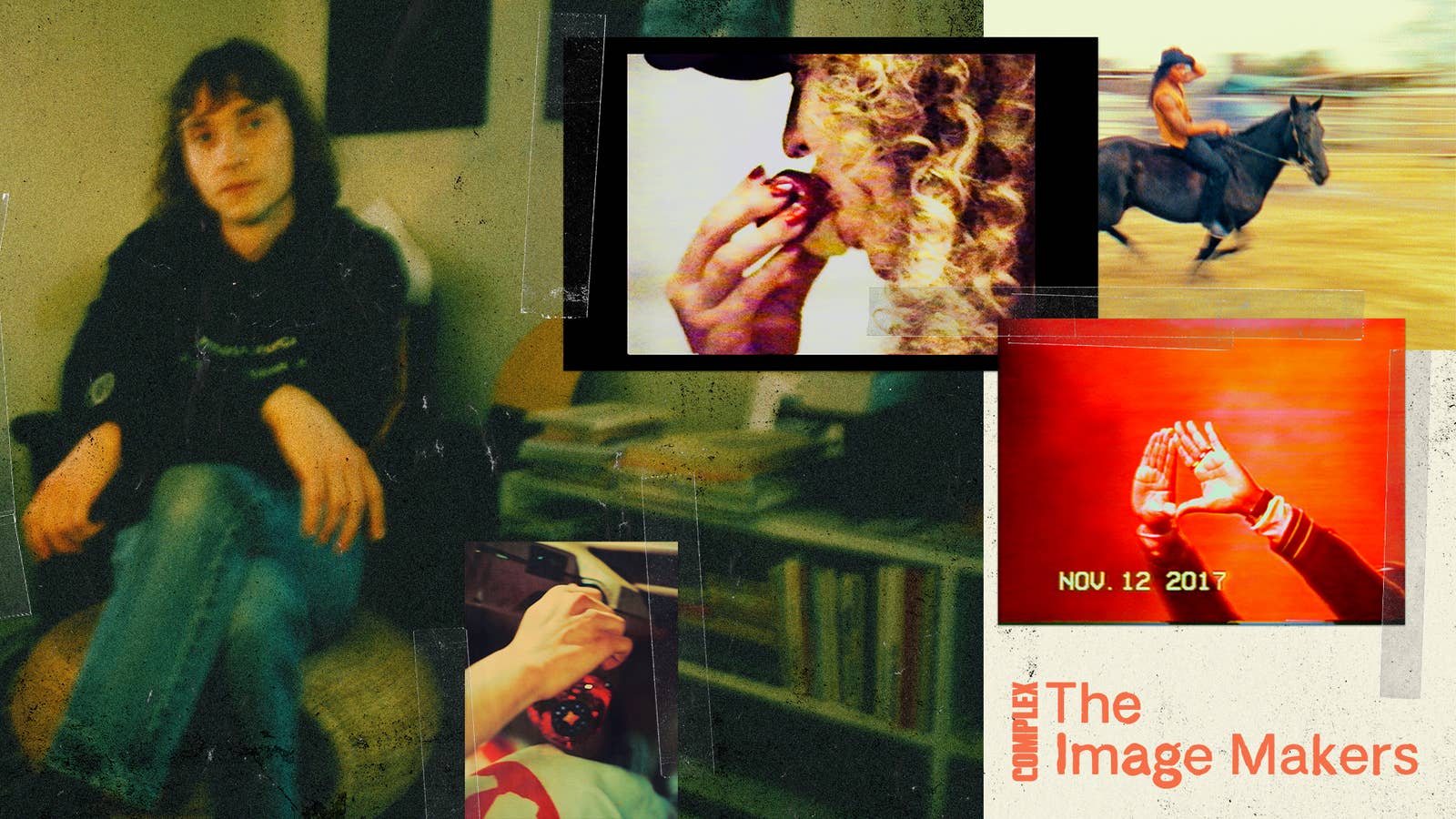
Julian Klincewicz can’t sit still. I can hear squeaks from his hammock through the phone. And I’ve seen his resume. He’s a filmmaker, photographer, musician, model, gallery artist, skater, fashion/graphic designer, co-founder of creative house Swish Projects and finally, a unicyclist.
Born in Chicago but raised in San Diego, Klincewicz is currently recalibrating at his new house in Costa Mesa, California with his girlfriend Irie Jean. At only 23 he’s worked with Beyoncé on her Netflix Homecoming film, and directed Virgil Abloh’s campaign visuals for Louis Vuitton, including Spring/Summer 2020 and Fall/Winter 2019, which notably featured grainy BTS footage of Steve Lacy, Blondey McCoy, Octavian, and more. Klincewicz has collaborated with Gosha Rubchinskiy, painter Kelsey Brookes, and shadowed Kanye West for a number of years. He’s been commissioned commercially for the likes of YEEZY, Calvin Klein, Acne Studios, Eckhaus Latta, VANS, RetroSuperFuture, etc. His work is singular and contemporary. And in his search for beauty in the mundane, Klincewicz has been keen on extracting moments of intimacy and humanity through glimmers of technicolor imagery.
“To be the type of person and artist that I want to be, which is ultimately a great communicator, it's going to require me to be a diverse artist. One thing that I've discovered in the past six months is, in the really deeply specific and personal, is the universal.”
Before all of this, he joined the circus for seven years as a unicyclist. Creativity was always around him—his mother is a teacher, painter, and writer, and his father is a pianist. He attended the Waldorf school, a specialized school in North San Diego that places great emphasis on kinesthetic learning, emotional intelligence, and imaginative skills as opposed to test results. This led to Klincewicz’s innate understanding of texture and emotions. Something clicked when his aunt gave him a VHS camera in 2013 from his grandmother’s attic and he started making lo-fi, blurry clips, shot on a Super 8mm film camera.
“I was lucky that I found a way to express video really early on that works for me. Those are just textures that I love and I'm interested in working with continually to create a visual language that’s emotional.”
Over several conversations, Klincewicz talks making a name for himself in the way he has, his multi-disciplinary work, becoming a storyteller, Maya Angelou as an inspiration, and the overarching themes of it all.
(This interview has been edited and condensed for clarity.)
How did you get into photography and videography?
I got into photo stuff in high school, maybe a little earlier, like eighth grade. My best friends at the time we're shooting photos and they were really into lomography and I was like, ‘Oh that's cool.’ So I started shooting a ton of photos with my little pin hole cameras, but it wasn't really anything, it was just for fun you know. Then probably sophomore year, me and a couple of my friends started a band in high school and we're like, ‘Let's make a music video.’ So I just shot a bunch of random footage on my phone and threw it together. About that same time, my aunt was cleaning out my grandma's house and found a VHS camera and mailed it to me. So now I have a camera and we're working on these little music videos, so this is kind of perfect, and I started shooting with that [VHS]. And at the same time I was skating with some of my friends and I decided let's make videos with that, too. And that's really just kind of how I got into it.
You just kind of started out of like happenstance?
Yeah. It was like well this is cool, this is new, I have a camera so I should use it.
And the first real camera you got was VHS?
Yeah.
How do you maintain your VHS camera and equipment? I'm assuming some of it could be dated because it's older format stuff so do you keep a bunch, or is it more you just kind of have your trusty steeds set of cameras that work for you?
They break all the time! Usually right in the middle of filming something super important, too. I've sort of found the staple cameras that I like to use but it also depends on the project. With film it's fun because different film stocks have different characteristics and you can do so much in editing to get a specific look. With tapes like VHS or DV—the camera plays more of a role in setting the characteristics of the footage.
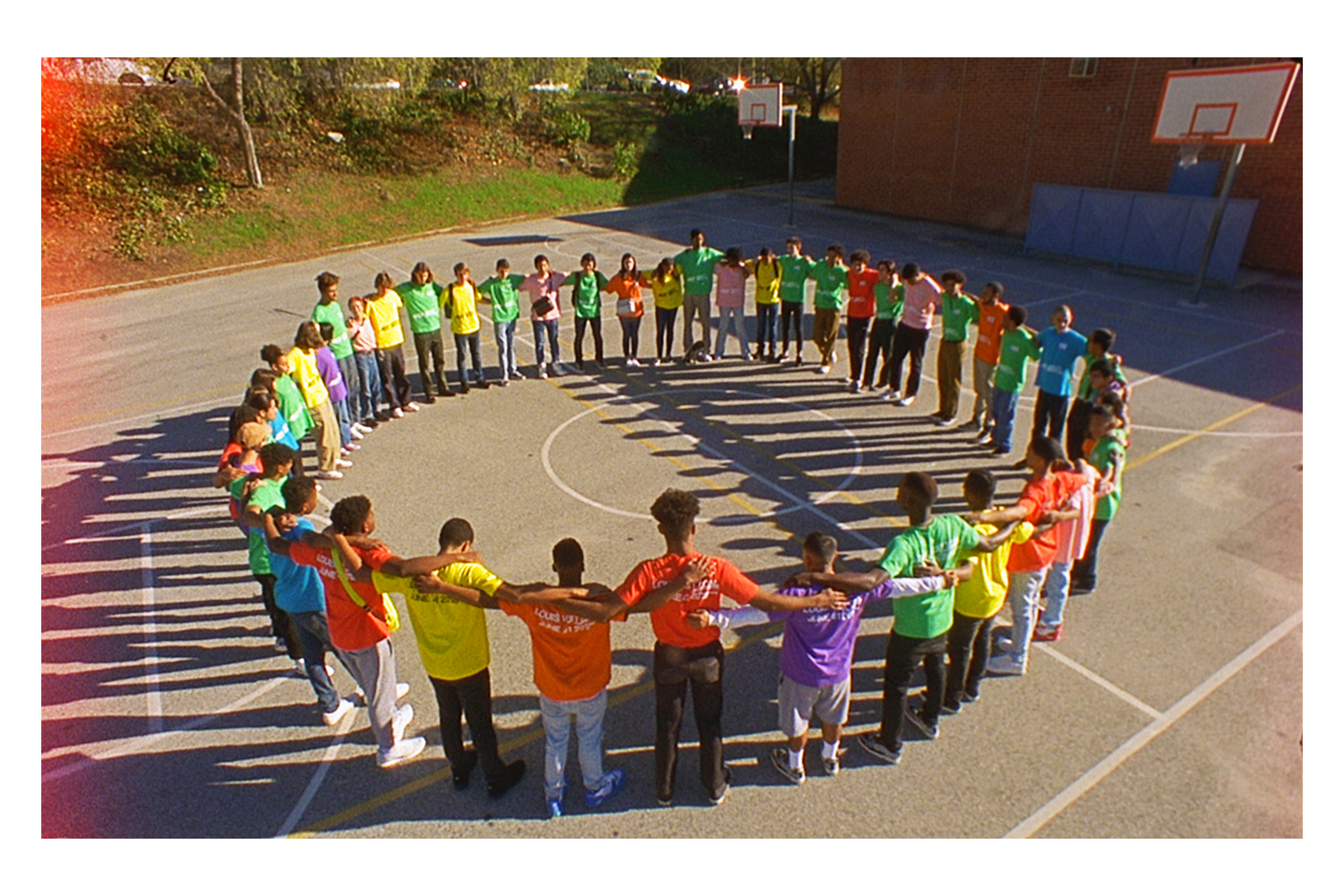
The Louis Vuitton campaigns have been interesting. Something that stuck out to me has been the titles: "Gestures of Humanity," "Unity and Compassion," etc. What were the ideas behind those pieces?
I've realized that any of the commissioned projects or branded work I do, I still approach it as if it was my own artwork. I’m an artist in residency, whether it's at Calvin Klein, Louis Vuitton or YEEZY, it's my job to make artwork based on the collaborator or that's inspired by what the collaborator is trying to say. In the case of these videos with Virgil and LV, that campaign specifically is for their “Staples” collection, which is like a carry over collection. Virgil basically says it's a staple—it's the new classics. What clothing has the power to do in my experience is shape a mood, shape how you're feeling that day, or add to how you're feeling that day. That led me to ask what are the staples of being human, as in what do we aspire to? And that turned into the title "Gestures of Humanity,” which for me those are compassion, joy de vivre (the joy of life), trusting your intuition, community—that’s all very important. So I came up with 10 key ideals that are important to strive for to have a meaningful life; purpose was one of them. When you exercise compassion to someone or when you feel like you have a purpose in life or when you have a moment where you just trust your intuition, it’s kind of like this abstract magic and you're like, ‘Oh, this just feels right,’ which is so much of what being an artist is. It keeps you in tune with being human and all of those things humble you and make you feel present and put you in touch with the greater idea of humanity.
How has working with Virgil helped you as a creative?
For me, it's just really inspiring to get to work with him. He's someone who is really creative and has a message to share. I think he's just really in touch with what this moment is and for me that's inspiring because as an artist who works within the pop culture sphere, you know what you aspire to do is make meaningful work, to make work that really does something for you and makes you feel like you're communicating something greater [through that vessel]. At best, art is just discovery. So to see an artist who is really in touch with this moment and is communicating with people through a huge array of mediums is inspiring for me and I think it's why it's so exciting to get to work on stuff with Virgil.

Does being part of galleries give you a fulfilling realization that you're really an artist?
Yeah I always get excited to be in any kind of gallery show because with a gallery you can just be like way [out there]. It's much freer, and with Coming Of Age, I took the team into consideration. It is a cool feeling, especially for this particular show. I wouldn’t believe somebody if they told me that I'd get to be in a group show with Ed Templeton, Inez and Vinoodh, Sandy Kim, Lucien [Clarke], or even Jim Goldberg one day. That’s insane to me. I feel so stoked to get to show work alongside all these people that I grew up learning from and just admiring their work. For this one I was just like blown away, appreciative, and honored to be amongst that lineup.
A common thread I've found in speaking with creatives is finding the magic in collaboration, is that something you've found too? Or do you work better alone?
I would say it depends. True collaboration is something I'm still learning.
Like when you did the Pure Desire project with Grace Ahlbom?
Well I think so. We touched on earlier, this idea of ‘23’ being a learning year. I do like working alone. I like sitting in my room by myself and working through every part of an idea so I feel like I'm discovering something about myself and about the world. I like that introversion and I think it's a huge part of my work. But over the past year I've gotten these bigger projects whether it’s the project with Beyoncé, Jay-Z's tour ,or the LV campaigns, and the only way stuff of that scale gets done is through collaboration. You need a team so it's born out of necessity, so that's something I've been doing—learning how to collaborate better. On these bigger shoots, I have to work with assistants and friends. And I work with my girlfriend a lot and it’s made me change my perspective on what my work is. You don't reach conclusions by yourself. You reach them through conversations, introspection, experience, the world, and translating that. Things are always a relationship and we never do anything alone. All work is very collaborative in theory, no matter how personal it may be. It's a super old idea like Michelangelo had artist's assistants painting for him but in this moment in 2019, where everybody is really talented and everybody is coming up with these crazy insights, it's the way that you're going to excel. It's a really modern way to work, the idea of being collaborative.
You working with Gosha led to you working with Kanye West, correct?
Yeah. I think through that work it got my name out there more. I'm really grateful that Gosha took a chance on me to work on those projects and through those videos. I got my name and my work on a bigger scale and then shortly after I did some stuff for Eckhaus Latta. I also did a short film for the band HAERTS called Power/Land. All that stuff was around the same time, within the scope of a year or so. I think all of that got my name through the grapevine and caught the eye of Kanye’s team, and eventually made it to Kanye.
In what capacity were you working with Kanye?
I was brought on to work on a video piece for YEEZY season 3, which coincided with the same time he was working on The Life of Pablo album—so it was just to document that process and offer any insights I had. I feel like Kanye really strives to surround himself with creative people, so a huge part of being in that family was just to be creative. I also ended up with “Creative Consultant” credit on TLOP, which was a pretty insane feeling.
What are some of the things you took away from the time period of documenting Kanye and his process?
One is that Kanye is really inspiring. Sitting next to him in conversation is like sitting next to a pure ball of creativity. The way his mind works and his drive to create the coolest possible thing for the most people, that was really important to me. It also opened my eyes to how to work within the medium of pop culture. It's amazing to see how much work goes into really creating something on that scale. How much care goes into every detail. He was really setting a precedent and diving into these sonic palettes and likewise with his color palettes. Witnessing the unabashed creativity he has gave me a new perspective. He is one of the most open-minded people I've ever met, too. Like truly open and curious about life, art, beauty, and about the challenges of it all. But yeah, really just the amount of work he and his team put into everything, that gave me a new appreciation for what’s possible and what it really takes to make those possibilities into a reality. If you really want to make something happen, don't expect anybody else to do it for you, ever. I think it’s fair to maybe expect help along the way, or hope for help, ask for help, but for that initial seed, you need to be doing it first. I see that reflected in a lot of the people I have gotten to work with whether it's Virgil, Kanye, Beyoncé, or any of these huge figures. They’re working hard, all the time, and their teams are working hard to support that.
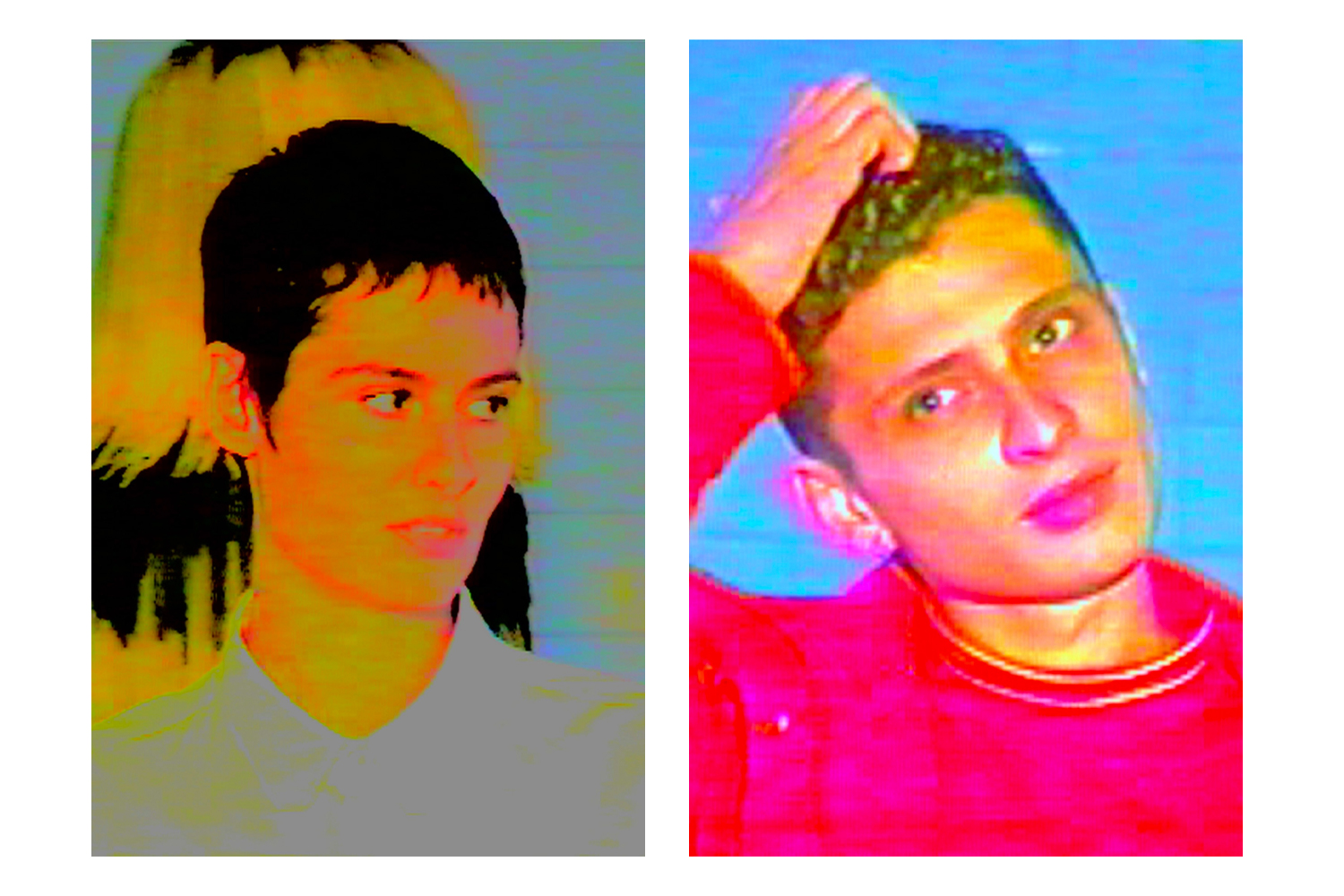
Can you briefly talk about the work you had produced prior to working with Gosha? How does one actually get to the point that these huge artists trust you enough to work with them, in terms of the path you take. How do you get onto those radars?
For sure! I’d been doing a lot of illustrative work and also taking tons of photos all throughout high school. I started doing video kinda late actually, which was also good, because it was so fresh and new that I was just excited to learn all about it and didn’t know or really have any frame of reference of what I wanted to do with it. I just wanted to film everything that was in front of me. In terms of having other people trust you, I think it’s largely just dependent on the collaborator’s taste and if you’re speaking the same artistic language in that moment, which a lot of times just comes down to timing. So much of anything is just being fortunate with timing and along with that, the best way to get on people's radars, and really just to be a happy person & artist, is to be part of a community. Support the people around you, and usually you’ll be supported by them too. No one makes it alone.
And how do you balance continuing to express your specific, singular vision through so many different campaigns you work on as well as through all the different mediums?
I think the main thing is just trying to be in touch with where I am in this moment. I've been thinking about this a lot recently and I think it really comes down to being present. I have this idea that most art is a battle against fear. If you're trying to communicate with people as an artist, a lot of that is at its core about being honest and open to what your experience is and what you're feeling at any moment. From that core, you translate it and your work can be ironic, it can be funny, it can be really pop, it can be super abstract, it can be anything you want. You shape it into a visual language or whatever that reflects your perspective or that of the brand you're working with.
In the trailer for Beyoncé's Netflix documentary Homecoming, there was a Maya Angelou line used that I thought was kind of a perfect touch. Was that your idea?
Wasn’t my idea for the trailer in particular, but I did track down that quote. It's from an interview she'd [Maya Angelou] done. When I took on the Parkwood project, I wanted to really understand what Beyoncé, the artist, was doing, what she has to say and [how I can] understand her world. I think a large part of that was delving into key cultural figures, and I've always been very inspired by Maya Angelou. For the three month period that I was filming for Homecoming, I probably listened to every one of Maya's interviews, read a bunch of her poems, and listened to her speak her poems. It's one of the most beautiful things just listening to her because you can't help but feel alive and feel as if your soul is being nourished. So thinking about that in relation to working on the Homecoming film, she [Maya] felt relevant because so much of my work has to do with humanization, and I think that element is what I had to offer to Beyoncé/Parkwood. I've heard a million things about Beyoncé, the artist, but who is Beyoncé, the human? And some how Maya Angelou seemed very relevant to that because she is so human.
How is it gaining trust to capture these really vulnerable and intimate moments for someone as big as Beyoncé?
I would say like in any situation you try to connect with people as another person; people are people. Everybody has a different story and a different understanding of the world. They’ve had a whole lifetime of experiences that have turned them into who they are and they've also probably shaped themselves in a lot of ways too, so all you can do is try and connect. For me, sometimes I can do it and sometimes I can't. It’s a lot easier for me to see those moments through a camera though, just to kind of bear witness to them, and show them from a place of love, rather than necessarily being part of them. A lot of the way I film has less to do with gaining trust and being part of the moment, and more to do with just very keenly observing what is happening on an emotional level in that given moment. Those human moments are happening all the time—I just really actively seek them out.
What's the biggest challenge of your job? Like for you when heading into a new project, what's the biggest challenge you tend to face either in the midst of the project or while developing the concept?
I'm not huge on generalizations, but I think a pretty common thing I find most difficult is the lack of time. Even when you have extra time and rolling deadlines, it never seems to feel like enough time. With video especially it becomes difficult because in many ways it's a medium about time, it's intrinsic. Music is similar too, the passage of time is part of the experience of the medium and as the artist, you don't want to waste people's time, but to arrive at the best use of the time in the piece, even if that takes a really long time [laughs]. I know that sounds wild, but I think it's true.
What was the most surreal moment for you working on this Parkwood project?
Yeah. I mean every part of it. Beyoncé is such an amazing artist and person so to even get the opportunity to work with her is a dream come true. I think honestly though the most surreal part for me was when they asked to use my Song “Aww Blue Sky” for the trailer. Like knowing that Beyoncé liked a song I made was just absolutely next level.
Was it eye opening seeing Beyoncé and her team’s work ethic?
Yeah she's incredibly inspiring and her whole team is inspiring. One thing that I would really say is that everyone there were such good people. That was the most fulfilling part. Everyone there is an amazing human being, regardless of what their skill set or talents are. I think it's underrated to be honest and being a good person before being a great anything else is very underappreciated. That was the best part as a person and as an artist. It taught me so much.
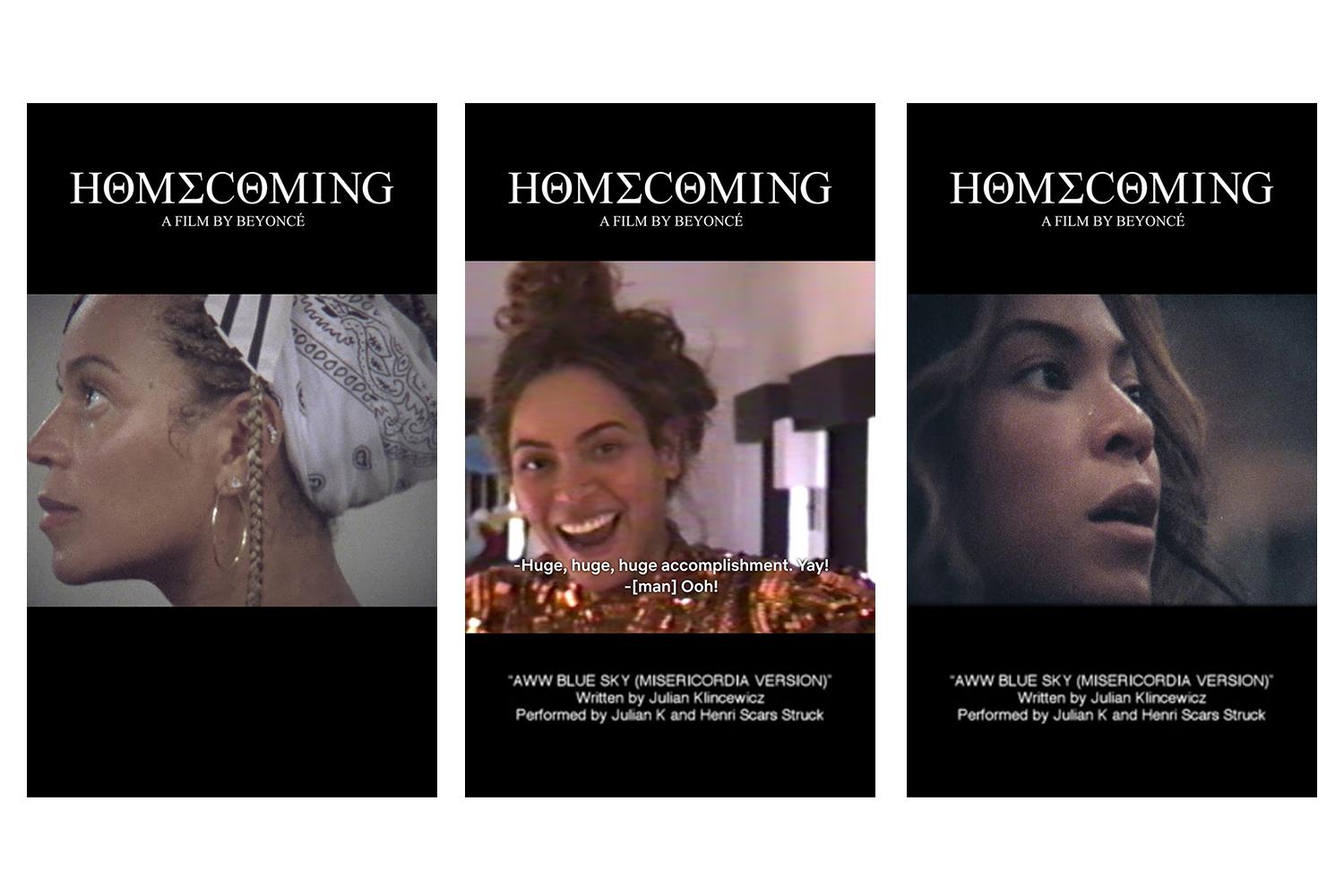
What's something about your own process that maybe people don't see?
I spend a lot of time editing. I make sure that for any video I make, every single frame is interesting to me. And I try to stop it when it stops being interesting. If I shoot an hour of footage, I'll maybe spend 10 to 12 hours editing.
I wanna talk about design for a second because I know you have your own clothing and even graphics that you work on, what is the impact that design can have on the world?
So my friend and I are starting a skate company. So for me, design wise it's just cool to make skate graphics, and they can be pretty deep. Like the Quasi ones that say, "I survived school today" with a picture of a gun. That is one of the best skate graphics of all time because it just reaches out and directly touches the audience. So many of their clientele are kids in high school, where surviving a day of high school is actually a gamble. I mean it's a statement that’s very strong and you're kind of like, "Wait, should they do that?" For me, I’m still searching for what it is that I want to say through clothing that no one else is saying or isn't saying in the way that I can say it. I want to figure out a way to make stuff that's cool and fun and you can just throw it on but also something that is more meaningful. One part of fashion I do love is the runway show and bringing people together and sharing this artistic vision.
It's like a movie in a way.
Yeah it's almost like a movie, you have the models who are the actors, the clothing aka the story, you have the lighting, the soundtrack, the theme, the audience, all those I think are really similar. Yeah wow, I've actually never made that connection.
In terms of the skate company that you and your friend are starting, I'm curious about that more. Is there a name for it? Prospective launch date? What do you want it to be? Anything else you want to share about things going on/coming up in your world right now?
Yeah so Dolan and I have been slowly working on a project called VCH. We’re still shaping it, but should have a lot to show towards the end of this year. No hard deadlines or a launch date — when it feels good we’ll put it out. In terms of other projects coming up, I’m hoping a lot of it will be music and maybe a book. I’ve been working on a lot of new music, and right now that feels like a bit of a North Star. I’m sure it’ll make its way into other things — clothing, video, skate stuff, writings, photos, maybe even dance. I’m just really excited about sound right now.
Something I wanted to ask you about was your typography, even on A Glimmer of Hope, I really like that font. It’s always very specific. How do you come to make those decisions?
Yeah I'm really picky about my type [laughs]. Most of my font choices, I'll go back to specific inspirations that have been really relevant to me in a deep way and I always want it to look cool, right? That's another thing with graphics, whether it's clothing graphics, a book cover, or an album cover, whatever it is, it kind of needs to look cool. It will do a good service to your artwork if something looks cool and then also has a deeper meaning underneath. So a lot of my font choices are through reference of something specific from my life.
Talk to me about your approach to fashion photography? Specifically this Dazed Spring 2020 Empire in Decline editorial? What was the inspiration for this concept?
Empire In Decline was inspired by a few things. One was just wanting to revisit some of my favorite places as a teenager: the car lot, this canyon, the streets of my neighborhood growing up, sunset cliffs near where my best friend lived, so tapping into that mindset of memory lane, some kind of angst, power and fantasy. But I was also thinking a lot about the zeitgeist of the world right now, specifically America and that phrase [Empire in Decline] kept coming to mind. Doesn't it feel like America is over in a way? I have this other phrase I like a lot, which is, "Our nature's will out,” meaning sooner or later, you are who you are and your truth will reveal itself because it cannot be contained. And sometimes those truths are hard and grim and kind of ugly , but that's not necessarily the point to dwell on. In acknowledging truth, you can learn from it, grow from it and in the end hopefully become a little better from it. Right now to me, America is an Empire in Decline. It's twisted and scary and feels like everything as we know it is ending, the roots have gone to rot and that feeling, in a romantic sense is a lot like adolescence — its energy, and uncertainty is the key to it all. Because if there's no certain outcome, you have more agency to shape the outcome and more potential for good, for compassion, for humanity, for community. And I think that's just a huge complex theme for me — Community. I really love to explore the idea of community through Fashion. That's what fashion is all about for me — People.
What does the future of your work maybe look like?
Something I was trying to get across is that I don't want to just be an observer and an emotional teller but so much of what I want to grow into is being a storyteller. And I think the growth that I need to do to get to that place of not just observing but also being a director and a storyteller. That is going to require me to come out of myself more and be more in touch with other people to challenge and expand what my experiences and notions are. I think the work I have to do to become the artist that I want to become is less about making artwork and more about being a human and prioritizing those moments/connections. To make full art, you really have to live a full life. So maybe the future of more work just has to do with living more life.

